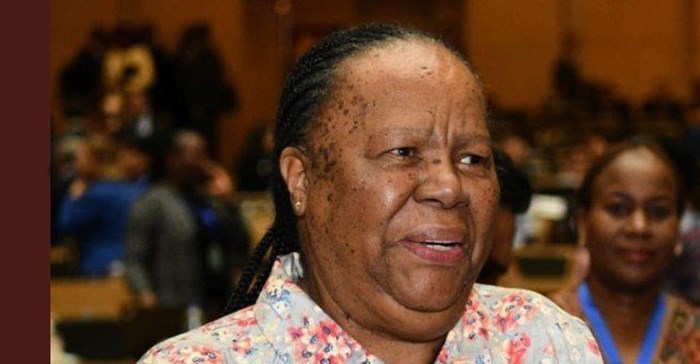The 14th International Congress of Human Genetics (ICHG 2023) - hosted for the first time in Cape Town - kicked off to a great start this week.

Source: Supplied. Naledi Pandor, Minister of International Relations and Cooperation delivered her keynote address at the opening of the 14th International Congress of Human Genetics at the CTICC this week.
Running until 26 February 2023, the congress brings together more than 1,200 researchers from across the world to discuss and exchange ideas on the latest developments and research in human genetics.
That the international congress of human genetics is hosted for the first time in Cape Town has broken new ground, and has set a precedent in changing the narrative on how scientists worldwide view the latest trends, technologies and research in genetics coming out of South Africa.
Professor Raj Ramesar, co-chair of the conference's organising committee and head of the division of human genetics at the University of Cape Town (UCT) remarked on this remarkable milestone.
"We have been part of the society of human genetics for decades, and the international congress of human genetics has always been hosted mostly in developed countries of the world such as the UK and Australia, but it has never before come to South Africa. I felt it was my duty to bid for it. I felt brave enough to use the theme "Coming Home" and to pitch on that theme."
“Coming Home” was chosen to celebrate the common genetic origin of all humanity here on the African continent.
“This meeting is an invitation to the world’s geneticists to come home, and to deliberate about our common heritage, and the remarkable advances that have been made with the tools of genomics, which have emerged from great endeavours like the Human Genome Project," Ramesar said. "It is also an opportunity to assess, while visiting home, the role that genomics has played, and is going to make in advancing human and global health.”
Celebrating advances in human genetics
"It is truly remarkable to think that the roots of human genetics can be traced back to our own continent," Naledi Pandor, SA's Minister of International Relations and Cooperation said at the opening of the congress on Wednesday.
"This congress is a unique opportunity for us to come together as a global community, and to celebrate advances in the field of human genetics that have been made since the last joint congress of the African and Southern African Societies of Human Genetics that was held here in Cape Town, in 2011.
"In South Africa, we are proud of the role that our scientists and researchers have played and continue to play in these efforts. Through partnerships like H3A Africa, our researchers are working to advance our own understanding of human genetics, and to make a positive impact on human health and wellness."
The first talk at the ICHG 2023 by Carina Schlebusch was a beautifully described story of our origin as humans. It elucidated what is understood about our ancestors, the complexity of Africa's migration patterns and how ancient DNA and genetics can help us to understand our past!
Genomics in Africa
This dovetailed with the critical theme running through the speaker presentations, that of the importance of including African populations and people of African descent in large-scale genetic studies.
"This is especially because the indigenous populations of Africa harbour the greatest depth of genomics variation," Pandor said. "One area in which there has been significant progress is in the understanding and treatment of non-communicable diseases. Advances in genomics have allowed for a better understanding of the underlying causes of these diseases, and the development of new and innovative treatments that can improve patient outcomes."
"Another area of critical importance is in the study of the Covid-19 pandemic. The role of genomics has been crucial in tracking the spread of the virus, and in understanding its underlying mechanisms. This work is critical to the global effort to develop effective treatments and vaccines, and to bring an end to the pandemic."
The speakers at ICHG 2023 highlighted too the importance of streamlining the integration of scientists' findings into clinical settings. In her keynote speech Implementing Equitable Genomic Medicine: Challenges and Opportunities Cathy Wicklund from the USA, spoke to the need for genetic counselors to only provide information their patients want to know, rather than providing information they think their patients need to know.
"We know that providing knowledge does not always equal behaviour change, so it's important when speaking to the people you want to educate, to first ask them questions about what's limiting them, and why they are coming for testing," she said.
Empowering our societies
Ultimately, Ramesar's vision for ICHG 2023 is one that has manifested in encouraging sustainability and inspiring young people to consider a career in genetics. He encourages young people to pursue becoming medical scientists, and to study a bachelor of science degree or medical technology in order to be able to diagnose genetic diseases.
"Genetics is the big frontier in understanding human disease and managing and treating it, he said, "and is relevant to all geneticists from around the world."
Currently data from Blueprint Genetics shows that inherited disorders are found in approximately 5% of the world's population, or around 350 million people, and that today's genetic testing technology can make a significant difference in long-term prognosis.
ICHG 2023 is hosted by the African Society of Human Genetics, the Southern African Society of Human Genetics and the International Federation of Human Genetics Societies.






































